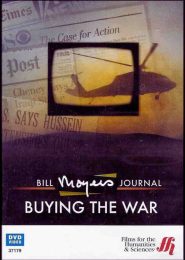Weapons of Mass Deception (2004)
Weapons of Mass Deception (WMD), directed by Danny Schechter, is a compelling documentary that dissects the intricate relationship between media, propaganda, and the Iraq War. Let’s delve into the film’s key themes and revelations.
- Two Wars: Military Assault and Media War:
- The documentary highlights the existence of two parallel wars during the Iraq conflict. While the military assault received extensive coverage, the media war remained largely hidden.
- Danny Schechter, an independent filmmaker and Emmy-award-winning TV journalist, turns his lens toward the role of the media. His film, WMD, critically examines how Pentagon propaganda and media complicity misled the American people while shaping international public opinion about the war.
- Media Complicity and Pentagon Propaganda:
- Schechter compares and contrasts media coverage globally. He uncovers exclusive material and conducts insider interviews to reveal the media’s role in this war.
- The film exposes how news outlets became conduits for Pentagon narratives. Journalists, often unwittingly, amplified the administration’s claims about weapons of mass destruction (WMDs) in Iraq.
- The chilling footage of an American tank firing on the Palestine Hotel in Baghdad, resulting in journalist casualties, underscores the media’s vulnerability and the consequences of their complicity.
- Spin and Misinformation:
- The documentary explores why newspapers and TV news were overwhelmingly pro-war in the lead-up to the invasion. While some believed the Bush administration’s claims about WMDs, other factors influenced media bias.
- Viewers learn about the relationship between news networks and the level of misinformation. The film challenges us to question the role of spin and journalistic integrity.
- Not About Saddam Hussein’s Brutality:
- Contrary to some misconceptions, Weapons of Mass Deception does not focus on Saddam Hussein’s brutality. Instead, it reveals the impact of American bombing on civilians, including children.
- The film emphasizes the responsibility of media outlets in shaping public perception. It forces us to confront uncomfortable truths about war and accountability.
- Video Games, Recruitment, and Entertainment:
- Beyond traditional media, the documentary touches on the influence of video games. Games like Call of Duty and Halo normalize warfare, blurring the line between entertainment and propaganda.
- Sony’s trademarking of Shock & Awe during the Iraq War underscores the overlap between entertainment and military strategy.
In summary, Weapons of Mass Deception is a thought-provoking exploration of media’s role in war. It challenges viewers to critically examine the narratives they consume and the hidden agendas that shape global events.




